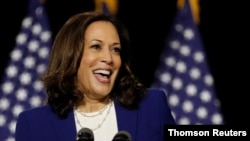Former Vice President Joe Biden made history by selecting Senator Kamala Harris as his vice presidential pick.
Harris is the first Black woman and the first South Asian American woman to be named on a major party ticket for a presidential election. As such, she will likely have to navigate gender and racial bias.
“I often compare it to walking a tightrope,” says Amanda Hunter, director of research and communications at the Barbara Lee Family Foundation, on the delicate balance required of women candidates. “Use humor but not too much humor, take credit but also share credit, dress well but not too expensive looking."
“We're likely to see, either from folks in the media or other thought leaders, scrutiny of Senator Harris' appearance, her tone of voice and her overall demeanor in a way that we don't see applied to male candidates,” she adds.
Harris is only the third woman vice presidential nominee for a major party in U.S. history. The most recent was former Alaska Governor Sarah Palin on the Republican ticket with the late Senator John McCain in 2008. The first was New York Democrat Geraldine Ferraro, who ran with Walter Mondale in 1984.
Racism and sexism
“We certainly know that U.S. political institutions are stubborn when it comes to the prevalence of racism and sexism,” says Kelly Dittmar, associate professor of political science at Rutgers University-Camden and director of research at the Center for American Women and Politics (CAWP). “I think if we can call it out, or even prevent it from happening in the first place, then we see the real evolution in these institutions that will ensure that they are more friendly to women and particularly women of color who come after Kamala Harris.”
Harris, a former California attorney general elected to the U.S. Senate in 2016, will likely have to work harder than her male counterparts have in the past to prove she has the right qualifications and temperament for the job. She has to worry about being “likeable” enough while coping with negative stereotypes associated with women who are considered “too ambitious.”
“That gets to deeper gender stereotypes about appropriate gender roles, feminine niceness, like you shouldn't be too competitive, you should be nice, you should be communal,” Dittmar says. “And then add to that racial stereotypes about aggression and Black women or angry Black women.”
Former President Barack Obama ran into trouble in 2013 when he referred to Harris as the “best-looking attorney general in the country.” The comment underscores the increased focus on appearance for women candidates as compared to male politicians.
“When we focus on women's appearance, we’re not focusing on their qualifications and their competency for the job, and the reason that matters more for women than it does for men is because there’re already doubts about women's competency and qualifications,” Dittmar says.
Holding the media to account
Women’s rights groups are already galvanizing to hold any sexist and racist media coverage and commentary to account. Time’s Up Now, which battles gender-based discrimination in the workplace, released a statement calling on the media to avoid “unfair coverage, double standards, and coded language that have held women – and especially women of color – from positions of power, across party lines, for far too long.”
The media was accused of gender bias while covering both Palin and Democrat Hillary Clinton in her bid for the White House in 2016. But in Hunter’s view, 2020 is already different in part because a record number of women have been elected to public office since the international Women’s March in 2017. As women become more politically active, they’re also becoming more vocal.
“We've certainly seen a shift in the conversation,” Hunter says. “We've seen women standing up for themselves and standing up for each other in real time, calling out sexism, both elected officials and also regular private citizens, on social media.”
Although she faces challenges, Harris also has new opportunities as the first woman of color on a major party ticket for a presidential election.
“There's an opportunity for Senator Harris to throw out the rulebook and chart her own course,” Hunter says, “because there's no exact roadmap for this moment, and that's something that's an exciting opportunity for her.”




